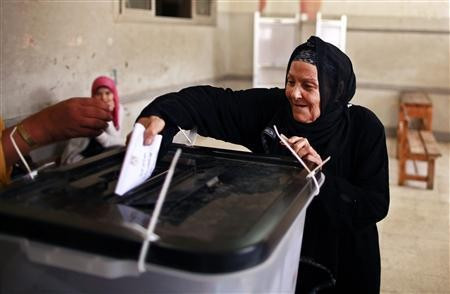Egypt to Choose Between Muslim Brotherhood Candidate Mohammed Morsi and Mubarak's Ex-Military Man Ahmed Shafiq

Unofficial results of the Egyptian presidential elections suggest Muslim Brotherhood candidate Mohammed Morsi and Mubarak's former Prime Minister Ahmed Shafiq are set to face each other in a run-off.
"There will be a run-off between Mohammed Morsi and Ahmed Shafiq," after 90 per cent of the votes were counted nationwide, the Islamist group said on its website.
The claim has not yet been confirmed by Shafiq's camp.
If the initials results hold, the two candidates will face each other in a second round run-off vote on June 16 and 17.
A Brotherhood official said that with about 90 percent of the votes Morsi had 25 per cent, Shafiq 23 percent a rival Islamist Abdel Moneim Abouel Fotouh 20 percent and leftist Hamdeen Sabbahi 19 percent.
Contradictory reports have surfaced, placing Sabbahi in third position ahead of Abouel Fotouh or Sabbahi in second position ahead of Shafiq.
If elected, Morsi has promised to implement Sharia law in a country where the constitution already defines the principles of Islamic law as the main source of legislation and called for a review of Cairo's 1979 peace treaty with Israel.
"We will take a serious step towards a better future, God willing," Morsy said at his final campaign rally on May 20.
Meanwhile Shafiq thanked those who voted for him and supported him over the course of the two days of voting and promised Egyptians more justice if he is elected.
"To the generous people of Egypt, justice is the rule of law," Shafiq wrote on his Facebook page.
"All thanks and appreciation for your efforts in supporting me as a candidate," he continued.
Shafiq's Facebook page also had a message addressed to presidential candidate Hamdeen Sabbahi.
"The Shafiq campaign salutes the honourable Sabbahi, and God bless him. If he wins we will not be upset because he is a patriotic man."
Shafiq has been criticised for his ties to the former Mubarak regime and Egyptian military. His critics see him as the preferred candidate of the ruling military, prompting fears the army could still maintain a tight grip on power behind the scenes.
The Supreme Council of the Armed Force, which assumed power after Mubarak was forced out of power and stepped down in February 2011, has pledged to hand over power to civilian rule after the president is elected in June.
Others see him as one of the few candidates able to bring about stability in the country.
© Copyright IBTimes 2025. All rights reserved.





















